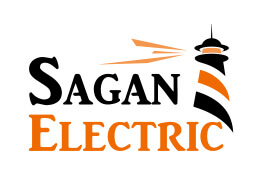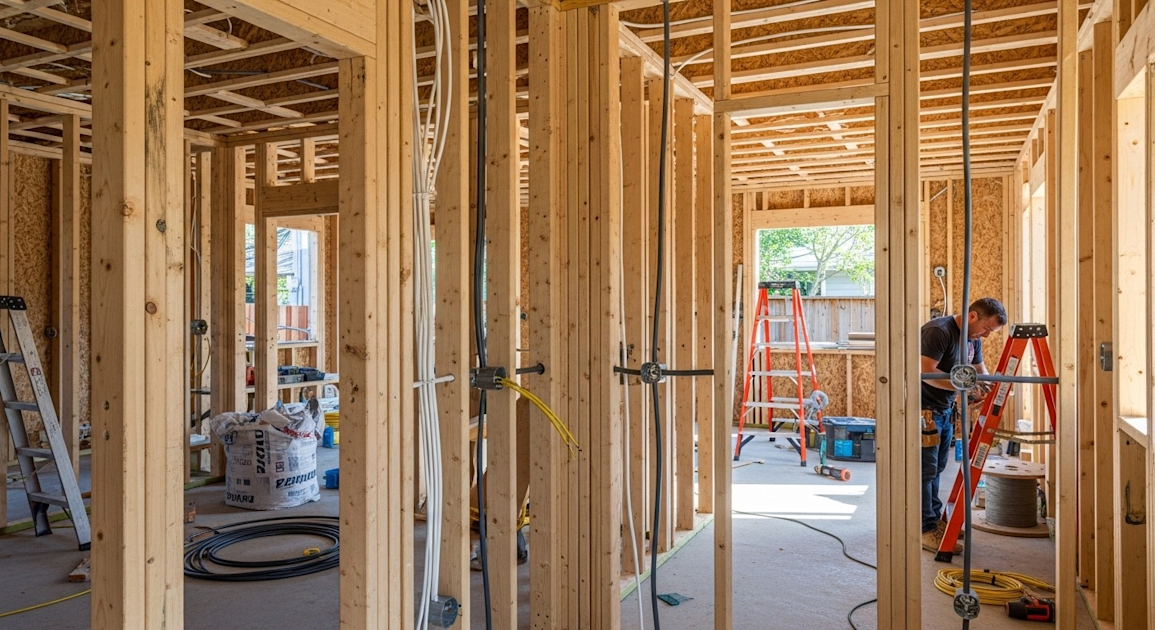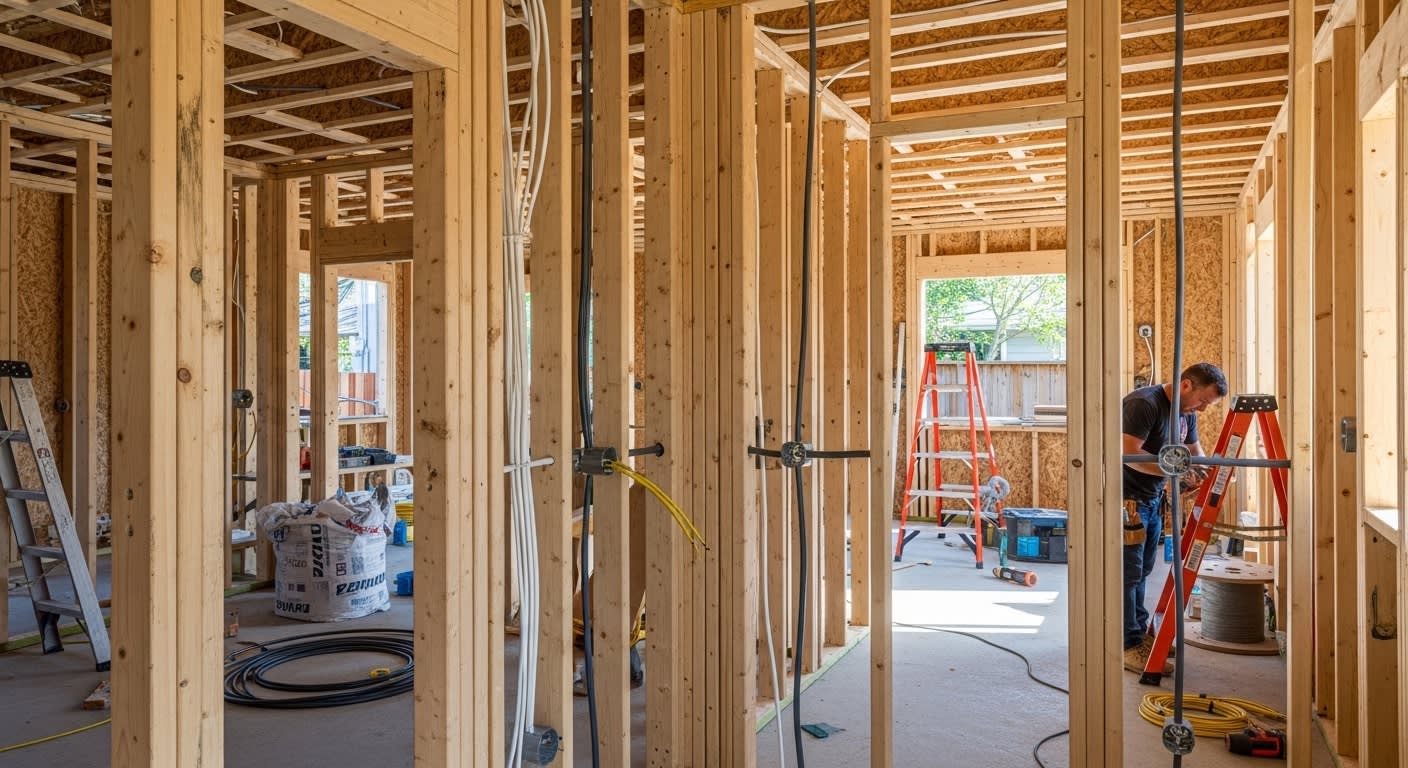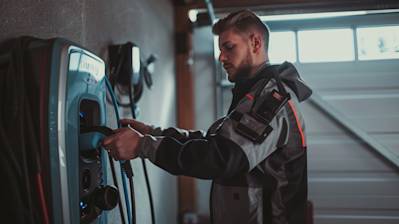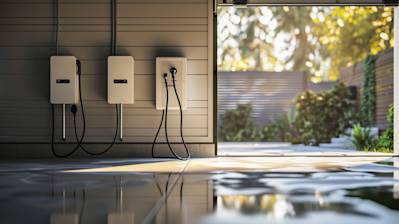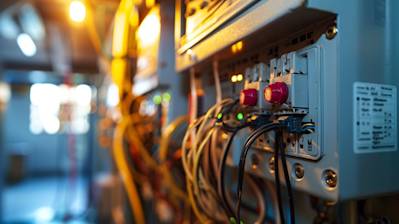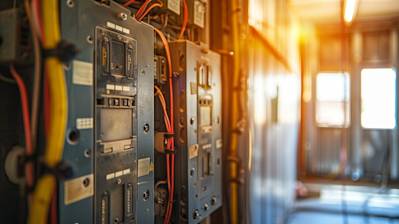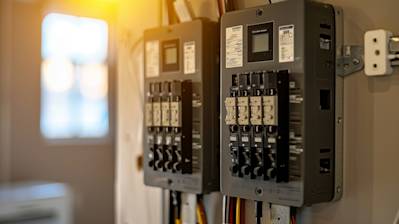In the current housing landscape, homeowners are increasingly considering secondary apartments on their property, known as Accessory Dwelling Units (ADUs). One of the critical aspects of successfully implementing an ADU is incorporating proper electrical wiring. This guide will delve into all the crucial aspects of electrical wiring for ADUs, and how to ensure they fit into stringent regulatory frameworks.
Defining Accessory Dwelling Units (ADUs)
Accessory Dwelling Units are secondary residential units hosted within, attached to, or on the same grounds as a primary residence. They can be an integral part of the home, a converted garage, or a separate stand-alone unit. Offering diverse uses such as rental income, home offices, or living spaces for family members, they are a great way to maximize property utility. Ensuring that these units have safe, adequate, and satisfactory electrical wiring is essential.
The Importance of Accurate Electrical Wiring in ADUs
Impeccable wiring plays a pivotal role in the ADUs, primarily because it impacts both safety and functionality. Wiring that is not correctly installed or sized for the electrical load can lead to fires, electrocution, or damage to appliances and electronics.
Professional electrical installation also protects the home's value, as haphazard electrical work could negatively impact the property's resale value due to safety concerns. Lastly, having proper electrical wiring ensures that the ADU is up to electrical code, which is critical for safety standards and insurance purposes.
Getting to Grips with ADU Electrical Wiring Considerations
Successful electrical wiring requires planning, knowledge, and understanding of the latest rules and regulations. There are many facets to consider when it comes to ADU electrical wiring:
-
Electric Load: Determine the kind of appliances to be installed in the ADU and ensure the ADU has the right-sized electrical service to handle the load.
-
Grounding: Grounding equips the ADU's electrical system with a safe way to channel excess electricity in case of a fault. It helps prevent electric shocks, which could prove to be fatal.
-
Circuitry Layout: Planning an efficient layout for plug points, switches and lights is key to creating a functional and comfortable space.
-
Permits and Safety Regulations: Make sure that any work in your ADU complies with local safety regulations and that you have the necessary permits.
Key Steps in ADU Electrical Wiring
The process of effective electrical installation for ADUs is a task that should be left to professionals. It requires proficiency in assessing electric capacities, installing circuits, and awareness of its set regulations. So, here is a broad step-by-step process used by professionals:
-
Inspection and Estimation: The first step usually involves inspecting the ADU's current electrical system (if any), discussing the homeowners' needs, and estimating the work's cost and duration.
-
Designing the Wiring Plan: An efficient wiring plan is drafted based on the gathered details such as the number and location of outlets, light fixtures as well as usage of switches and appliances.
-
Procurement of Permits: Most electrical works require permits, which ought to be acquired before commencing the project. The plan may need to be approved by the local electrical inspection agency.
-
Installation: With the plan ready, the actual wiring begins with mounting the circuit breaker panel and running the cables before installing switches, outlets, and light fixtures.
-
Inspection and Testing: After installing the wiring, it is thoroughly inspected and tested to ensure it is safe, operational, and up to code.
Navigating Through Codes and Regulations
Navigating through the myriad of codes and regulations for ADU electrical wiring can be challenging. It's useful to have a good understanding of the regulations both on a national level (as defined by the National Electrical Code), and on a local level (regulations vary city to city).
For example, the National Electrical Code has specifications on:
- Minimum number of electric outlets in rooms, halls, and stairways
- Number of lighting outlets required in all rooms and bathrooms
- Requirement of Ground Fault Circuit Interrupter (GFCI) protection for all receptacles in bathrooms, kitchens, rooftops, etc.
Remember, in addition to following code, all electrical work has to be inspected and approved by your local authority.
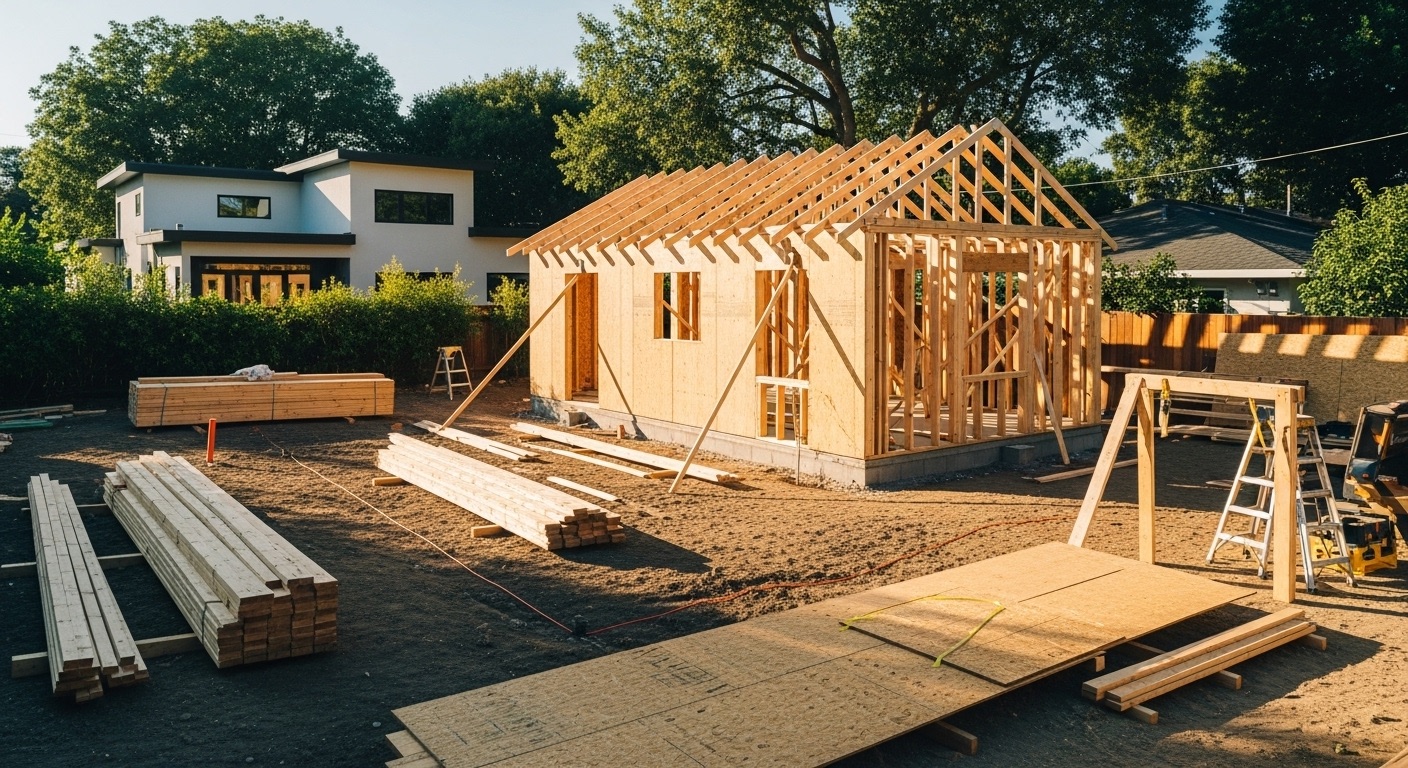
Frequently Asked Questions about Adu Electrical Wiring
How is an ADU electrical wiring typically designed?
The design process of electrical wiring in an ADU can differ based on the unit size and whether it is attached or detached. The key, however, is to ensure complete compliance with local, state, and National Electrical Code (NEC) regulations. A professional contractor or electrician can guide you through the process, assisting with design, planning, and organization of wiring routes and electrical connections.
What factors should be considered while making a wiring plan for ADU?
The electrical wiring plan for an ADU should take into account several factors. These include load requirements, comfort, safety, possible future expansions, and energy efficiency considerations. Positioning of lights, outlets, switches, and appliances and their power utilization should also be factored in.
Is ADU electrical wiring different from a regular home's electrical wiring?
In essence, the fundamental concepts and guidelines apply to both ADU electrical wiring and a regular home. However, depending on whether the ADU is attached or detached, unique considerations may come into play. Detached ADUs, for example, usually require their own dedicated electricity panel.
Can I use the existing home’s electrical system for an ADU?
A lot depends on whether your existing home’s electrical system has enough capacity to power an additional ADU. If it doesn’t, you will need an upgrade or a separate service panel. We recommend consulting with a professional electrician or the local permitting office to get a definitive answer.
How often should an ADU electrical system be inspected?
For safety, the NEC recommends that every dwelling unit should have a full electrical inspection every 10 years. However, if there is any issue or if you are adding new equipment, you should have an inspection more often.
How can I make my ADU electrical system more energy efficient?
Use of energy-efficient appliances, proper insulation, and LED light fixtures can help reduce electrical usage in an ADU. Regular maintenance and timely upgrades of your electrical system also contribute to energy efficiency.
How much does ADU electrical wiring typically cost?
The cost of electrical wiring for an ADU varies widely based on factors like the size of the unit, type of materials used, and local labor costs. It's best to get estimates from several local professionals to get a clear idea about the expected costs.
Can I do the ADU electrical wiring myself?
While minor fixtures or replacements might be manageable to an extent, it is strongly recommended to hire a professional electrician for ADU electrical wiring. This ensures that all work aligns with safety regulations and local building codes, preventing potential shock hazards or fire risks.
Pros of ADU Electrical Wiring
Saves on Energy Costs
The biggest advantage of ADU electrical wiring is that it saves significantly on energy costs. By setting up a separate electrical wiring system in your Additional Dwelling Unit (ADU), you ensure that the energy consumption is exclusive to that unit alone. Therefore, you can control and monitor the energy usage in the separate housing unit more accurately. This can come in handy, especially if there are electrical appliances or setups that have discrete energy requirements.
Enhances Safety
Another major advantage of ADU electrical wiring is the enhancement of safety. A separate dedicated wiring setup for the ADU allows the unit to have an isolated electrical system, which signifies that any electrical problem occurring within the main property doesn’t necessarily affect the ADU. This isolation provides important safety benefits by reducing the risk of electrical fires spreading from the ADU into the main house.
Provides Greater Control and Flexibility
Having a separate wiring setup for the ADU provides greater control over energy use and provides flexibility to upgrade or alter the electrical system in the unit without disturbing the main property. If you intend to modify your ADU in the future – like adding kitchen appliances or an entertainment system – having separate wiring makes these alterations simpler and easier.
Contributes to Increasing Property Value
ADUs can enhance the value of your property by offering additional living space, and having separate wiring provides a more convenient and sustainable environment in the unit. This dedicated electrical system can prove to be a major selling point and may significantly contribute to the increase in the property's overall value.
Cons of ADU Electrical Wiring
High Upfront Costs
One of the main disadvantages of ADU electrical wiring is the substantial upfront cost involved in setting up the separate electrical system for the unit. This not only includes the cost of wiring, circuit breakers, and other materials but also the labor cost of a licensed electrician.
Complexity in Implementation
Setting up a separate electrical wiring for the ADU can also be a complex task. It involves numerous steps which include obtaining permits, digging trenches for underground wiring, installing separate metering equipment, and getting inspections done. The entire process can be lengthy and requires assistance from professionals.
Ongoing Maintenance Requirements
Though ADU electrical wiring offers an isolated system that reduces potential damage to the primary property, it has its own maintenance requirements. Periodic inspections, upgrading outdated wires, fixing broken circuits, or other similar maintenance work may become necessary, which poses additional operational costs and time.
Electrical Capacity Issues
Depending on the existing electrical capacity of the property, adding a separate wiring system for the ADU may exceed the existing electrical infrastructure's ability to support it. This might necessitate upgrading the service panel or even replacing the current electrical system--both of which would severely multiply the project's overall costs.
Regulatory Obstacles
In some regions, regulatory requirements regarding the installation and usage of ADU electrical systems can be restrictive. These might relate to safety concerns, noise levels, aesthetic factors, or other community standards. These restrictions or regulations can affect design choices, increase costs, cause delays, limit usage options, or otherwise add uncertainty and risk to the project.
Myths and Misconceptions About ADU Electrical Wiring
With the rising popularity and practicality of accessory dwelling units (ADUs), many questions arise about the intricate details and requirements of the process. One of the most misunderstood aspects of ADUs is the electrical wiring. Due to a lack of clear information or an abundance of misinformation, there are several misconceptions about the requirements, installation process, and safety standards. Let's debunk some of these myths and misconceptions today.
Myth 1: One Main Panel Is Sufficient for Both the Main House and the ADU
The idea that the main power supply for the principal residence is enough for both the main dwelling and the ADU is not only incorrect but could also potentially be dangerous. The electrical wiring of an ADU is complex and requires its sub-panel. This dedicated sub-panel ensures that the ADU’s power usage is differentiated from that of the main house. A unique sub panel will allow the ADU to have its independent power circuit, avoiding overloads that may lead to shorts or fires.
Understanding Load Capacity
It’s important to understand the concept of load when referring to electrical systems. The total amount of electric energy your home or ADU can consume is limited. Try to power too many high load devices from a single source, and you will overload the circuit, risking damage to the electrical system, or in a worse-case scenario, causing a fire.
Myth 2: ADU Electrical Wiring Process Is a DIY Task
While DIY solutions can be cost-effective and sometimes fun, electrical wiring should always be done by a licensed electrician. A misconception that prevails regarding ADU electrical wiring is that it's a simple enough process that homeowners can carry out themselves. This is not only untrue but could also carry the risk of potential electrical hazards.
Why Hire a Licensed Electrician?
A licensed electrician is well-versed in electrical standards, local codes, and safety measures. They can correctly calculate the load, do the necessary wiring without causing hazardous scenarios, and ensure that all your appliances and fixtures receive the right amount of power for their correct functioning.
Myth 3: All ADUs Require the Same Kind of Wiring
Contrary to what many believe, every ADU has unique wiring needs. The kind of wiring necessary depends on many factors: the size of the unit, the appliances installed, the anticipated load usage, and more. An electrician will be able to assess the exact needs and provide the most suitable and safe wiring solution.
Myth 4: ADU Electrical Wiring Is Always a Huge Expense
While it would be incorrect to claim ADU electrical wiring is cheap, the costs can greatly vary. This misconception likely arises from instances where unexpected complexities in the wiring process or corrections of pre-existing faulty wiring lead to higher costs. In reality, the expenses related to electrical wiring depend on a multitude of factors like the square footage of the ADU, the complexity of the wiring needed, the local code requirements, and more.
Savings With Energy-Efficient Appliances
One way to mitigate the operational cost of ADU electrical power usage is to invest in energy-efficient appliances. These appliances are designed to consume less energy for the same tasks, reducing the overall demand on your electrical system.
Myth 5: Universal Electrical Codes Apply to All ADUs
While there are national electrical codes, it's essential to remember that local municipalities or states may have additional codes or standards that a homeowner must meet. These local laws can address unique local conditions and are designed to ensure the safety and adequacy of an ADU's electrical system.
In summary, when it comes to ADU electrical wiring, it's crucial to not fall victim to prevailing myths and misconceptions. Always aim to consult with a professional who's up-to-date on local laws and regulations and is knowledgeable about safe and effective electrical installation procedures. To prevent mishaps, ensure you have a firm understanding of the procedures involved, and when in doubt, always consider reaching out to a professional electrician.
Summary
Overall, ADU electrical wiring is vital to the functionality and safety of your accessory dwelling unit. Ensuring it's installed correctly and checked regularly can make a substantial difference. Routine maintenance and inspections allow potential issues to be identified before causing harm or damage.
While many people might overlook the significance of ADU electrical wiring, it's crucial that it's done properly and adheres to all safety codes and regulations. This can also help avoid unnecessary costs further down the line, keeping your unit up and running smoothly. Let’s also be honest - who wants to deal with flickering lights or blown fuses when you least expect it?
Lastly, though undertaking ADU electrical wiring might seem daunting, it's well worth it in the end. It gives you peace of mind knowing your unit is safe and powered efficiently. It's great knowing you're minimizing risks while effectively powering up your space. So, when planning your ADU, give the boring but significant aspect of electrical wiring the attention it deserves. You’ll thank yourself later.
About Sagan Electric
Sagan Electric is your trustworthy, local electrical services provider proudly serving the vibrant community of Sacramento, CA. We take pride in offering a comprehensive range of solutions for all your electrical needs, from installations to upgrades and repairs. Our team of experienced and highly skilled electricians brings unrivaled expertise, commitment, and a dash of local flavor into the services we offer - ensuring that we meet your needs with the utmost passion, precision, and professionalism. And at Sagan Electric, we're not just about providing services – we're about building relationships, lighting up homes, and empowering our local community, one socket at a time. Join the Sagan Electric Family, your perfect partner in powering your world.
Tags: ADU, electrical wiring, home improvement,
